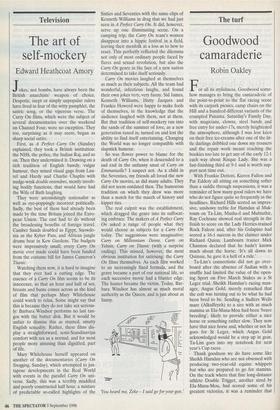Television
The art of self-mockery
Edward Heathcoat Amory Jokes, not bombs, have always been the British anarchists' weapon of choice. Despotic, inept or simply unpopular rulers have lived in fear of the witty pamphlet, the satiric song, or the viperous verse. The Carry On films, which were the subject of several documentaries over the weekend on Channel Four, were no exception. They too, surprising as it may seem, began as sharp social satire.
First, as A Perfect Carty On (Sunday) explained, they took a British institution: the NHS, the police, the Indian Raj, and so on. Then they undermined it. Drawing on a rich tradition of English bawdy, vulgar humour, they mixed visual gags from Lau- rel and Hardy and Charlie Chaplin with nudge-wink double entendres, mostly involv- ing bodily functions, that would have had the Wife of Bath laughing.
They were astonishingly nationalist as well as eye-poppingly incorrect politically. Sadly, the best of them had already been made by the time Britain joined the Euro- pean Union. The cast had to do without the broadening benefits of foreign travel. Camber Sands doubled as Egypt, Snowdo- nia as the Kyber Pass, and African jungle drums beat in Kew Gardens. The budgets were impressively small; every Carry On movie ever made could have been funded from the costume bill for James Cameron's Titanic.
Watching them now, it is hard to imagine that they ever had a cutting edge. The essence of a Carry On film seems to be its innocence, so that an hour and half of sex, breasts and bums comes across as the kind of film that perhaps Mary Whitehouse could watch to relax. Some might say that this is because they do not take sex serious- ly: Barbara Windsor performs no last tan- gos with the butter dish. But it would be unfair to dismiss this as stunted, smutty English sexuality. Rather, these films dis- play a straightforward, semi-Scandinavian comfort with sex as a normal, and for most people more amusing than dignified, part of life.
Mary Whitehouse herself appeared on another of the documentaries (Carry On Snogging, Sunday), which attempted to jux- tapose developments in the Real World with events in the parallel Carry On uni- verse. Sadly, this was a terribly muddled and poorly constructed half hour, a mixture of predictable so-called highlights of the Sixties and Seventies with the same clips of Kenneth Williams in drag that we had just seen in A Perfect Carry On. It did, however, serve up one illuminating scene. On a camping trip, the Carry On team's women disappear into a hippie festival in a field, leaving their menfolk at a loss as to how to react. This perfectly reflected the dilemma not only of most ordinary people faced by flares and sexual revolution, but also the Carry On genre in the face of a new nation determined to take itself seriously.
Carry On movies laughed at themselves as much as their subjects. All the team had wonderful, infectious laughs, and found their own jokes very, very funny. Sid James, Kenneth Williams, Hatty Jacques and Frankie Howerd were happy to make fools of themselves, in the knowledge that the audience laughed with them, not at them. But that tradition of self-mockery ran into the sands of the summer of love, as a new generation tuned in, turned on and lost the ability to find itself entertaining. Changing the World was no longer compatible with slapstick humour.
So was flower power to blame for the death of Carry On, when it descended to a sad end in the unfunny smut of Carry on Emmanuelle? I suspect not. As a child in the Seventies, my friends all loved the new Carry On movies, as did many adults. They did not seem outdated then. The humorous tradition on which they drew was more than a match for the march of history and kipper ties.
The real culprit was the establishment, which dragged the genre into its suffocat- ing embrace. The makers of A Perfect Carry On asked a range of people what they would choose as subjects for a Carry On today. The suggestions were imaginative: Carry on Millennium Dome, Carry on Yeltsin, Carry on Titanic (with a surprise ending). This missed, however, the most obvious institution for satirising: the Carry On films themselves. As each film worked to an increasingly fixed formula, and the genre became a part of our national life, so each successive movie had a blunter edge. The hunter became the victim. Today, Bar- bara Windsor has almost as much moral authority as the Queen, and is just about as funny.
`You heard me, Zeke — I said go for your gun.'


























































 Previous page
Previous page